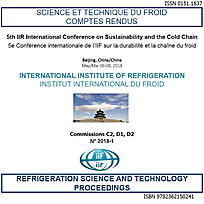
Summary
High and low temperature levels are using R410A as refrigerant, and expansion of the containers and other devices do not need to set in flow single-refrigerant cascade refrigeration system. It makes system structure is more simple.The refrigerant flow can be controlled by the frequency of compressor in this refrigeration system.Study and analyze the effect of evaporation temperature incremental and high temperature compressor frequency incremental on system performance.The flow ratio decreases and COP increases with evaporation temperature increases when condensation temperature is constant in the cascade refrigeration system. The maximum flow ratio of the high temperature level decreased by 0.071% and the flow ratio of the low temperature level increased by 0.27% when the evaporation temperature increased by 1K. Meanwhile the flow ratio decreased by about 1.36%, and the interstage capacity ratio increased by 1.5%, and the COP maximum increased by 3.76%. And the interstage capacity ratio maximum decreased by 2.62% when the frequency of compressor increased by 1Hz. Through changing the frequency of compressor, the energy consumption can be reduced. And the COP can be improved and the system is more energy efficient.
Available documents
Format PDF
Pages: 8
Available
Public price
20 €
Member price*
Free
* Best rate depending on membership category (see the detailed benefits of individual and corporate memberships).
Details
- Original title: Experimental study on single-refrigerant cascade refrigeration system.
- Record ID : 30023398
- Languages: English
- Source: 5th IIR International Conference on Sustainability and the Cold Chain. Proceedings: Beijing, Chine, 6-8 avril 2018
- Publication date: 2018/04/06
- DOI: http://dx.doi.org/10.18462/iir.iccc.2018.0044
Links
See other articles from the proceedings (72)
See the conference proceedings
Indexing
-
Themes:
Compression systems;
HFCs - Keywords: Refrigerating system; R410A; Temperature; Performance; Cascade system; Evaporation; Testing; COP
-
Miscele di CO2 + HFC per cicli in cascata opera...
- Author(s) : DI NICOLA G., GIULIANI G., POLONARA F., et al.
- Date : 2003/06/27
- Languages : Italian
- Source: Le ultime tecnologie del freddo e del condizionamento [+ annex, videolezione and CD-ROM]./ Technological innovations in refrigeration and air conditioning [+ annex, video and CD-ROM].
View record
-
Experimental evaluation of a cascade refrigerat...
- Author(s) : SOUZA L., ANTUNES A., MENDOZA O., et al.
- Date : 2015/08/16
- Languages : English
- Source: Proceedings of the 24th IIR International Congress of Refrigeration: Yokohama, Japan, August 16-22, 2015.
- Formats : PDF
View record
-
Thermodynamic analysis of a CO2-NH3 cascade ref...
- Author(s) : DOPAZO A., FERNÁNDEZ-SEARA J., ARIAS A., et al.
- Date : 2007/08/21
- Languages : English
- Source: ICR 2007. Refrigeration Creates the Future. Proceedings of the 22nd IIR International Congress of Refrigeration.
- Formats : PDF
View record
-
Development and performance analysis of a multi...
- Author(s) : LIANG Y., LI H. Q., WANG D., et al.
- Date : 2010/07/12
- Languages : English
- Source: 2010 Purdue Conferences. 13th International Refrigeration and Air-Conditioning Conference at Purdue.
- Formats : PDF
View record
-
Research on the inner cycle on the auto-cascade...
- Author(s) : ZHANG S. Q., DU K., WANG Z. L., et al.
- Date : 2007/08/21
- Languages : English
- Source: ICR 2007. Refrigeration Creates the Future. Proceedings of the 22nd IIR International Congress of Refrigeration.
- Formats : PDF
View record
